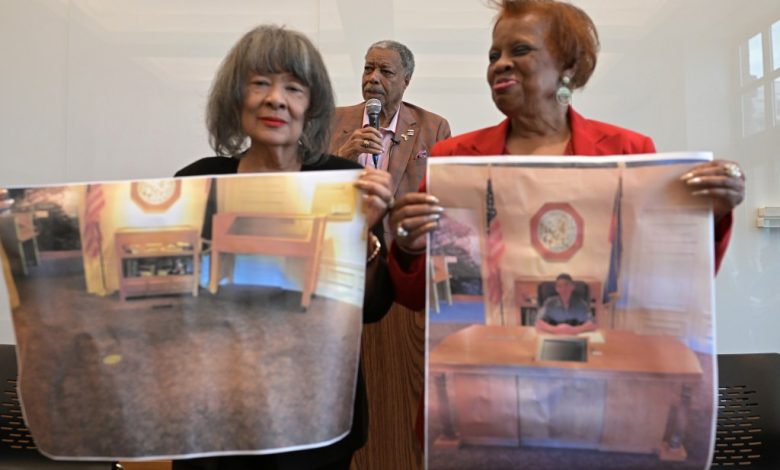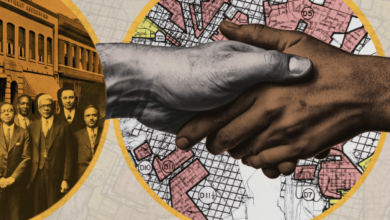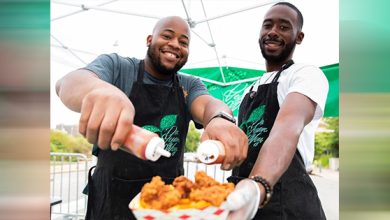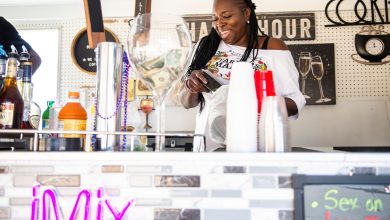Denver Public Library apologizes for removing Black history displays

Tamara Rhone wants to know what happened to a showcase inside Denver’s Blair-Caldwell African American Research Library that displayed memorabilia from her father’s pioneering Black law firm.
A few months ago, staff removed the display case in the library’s upstairs museum and all of the belongings inside it. The collection that represented her father, Robert Rhone, and his law partner, Irving Andrews, is still missing.
“I used to come up on the second and third floor and bathe in the history,” Rhone said. “We need to know our history. Our children need to know our history. This was the facility that was built to honor that.”
The missing displays that once filled the lobbies of two floors of the library sparked anguish in the Five Points neighborhood as leaders in the Black community feared the Denver Public Library was erasing their history and disrespecting a community that has contributed so much to the city.
The library’s interim director has now apologized and the display cases are being restored.
The removal of the displays comes as President Donald Trump’s administration has scrubbed stories of Black Americans and other non-white people from government websites, purged books on civil rights and racism from libraries on military academy campuses, and threatened to cut funding from public schools and city governments — including Denver’s — that don’t eliminate diversity, equity and inclusion programs.
That backdrop made the removal sting even more.
“Many of us have fought and bled for our cases to be there,” said former Denver Mayor Wellington Webb. “This library holds our past, our present and our future. This has our history about who we are and what we are about.”
Five Points, once known as the “Harlem of the West,” has been gentrified over the last two decades, with Black families being priced out and multi-story apartment buildings towering over Welton Street, the historic district’s main corridor. As those families left the neighborhood, the Blair-Caldwell library — Colorado’s only African American research library — remained as a beacon of their history in Denver.
On Tuesday, two employees wearing white gloves were reassembling posters, pictures, T-shirts and performance programs inside a case in the museum honoring Cleo Parker Robinson, a groundbreaking choreographer and dancer who owns the eponymous dance studio in Denver.
The redecorating came as Webb convened a community meeting on Wednesday afternoon so people could air their grievances and Denver Public Library officials could discuss their plans going forward.
At that meeting, interim city librarian Theresa Liguori apologized for the removals, telling the dozens of people who attended, “From the Denver Public Library staff, we apologize for any feeling of erasure.”
Liguori insisted no one was trying to intentionally erase Denver’s Black history, although several people in the audience mumbled disagreement as she spoke.

Webb and his wife, former state Rep. Wilma Webb, led the charge to build a library and archives in the Five Points neighborhood. Blair-Caldwell opened in 2003 with a library on the first floor and a museum and archives for Denver’s Black history on the second and third floors.
Over the years, prominent Black Denverites were allowed to sponsor display cases to house memorabilia, commemorating their contributions to the city’s history. Displays represented organizations such as the Colorado Council of Black Nurses and Jack and Jill of America, as well as individuals including Adetunji Joda, a Nigerian immigrant who taught drumming, and Nathaniel Estes, who owned a plumbing business in the neighborhood.
Faye Rison, who taught at Metropolitan State University of Denver from 1970 to 2000 as one of its early Black women professors, said she came to the Blair-Caldwell library recently for a meeting and went upstairs to look at her display case. It was gone.
“None of the cases were here,” Rison said. “I asked questions — what happened? Where are my things? They didn’t tell me anything.”
Rison’s case was back on display Wednesday. The most valuable object inside is an elephant ivory carving of an African prince. Ivory is banned in the United States, but Rison said she brought it home from a trip to Africa in the 1980s. It’s worth hundreds of dollars. The case also holds an assortment of plaques and certificates she received as a professor that have little monetary value but mean the world to her.
“It’s just like finding somebody dead and it’s all gone,” Rison said.
‘This isn’t Meow Wolf’
The cases were removed for multiple reasons, including a need for better preservation, according to those involved in the library.
The new museum and archives supervisor, Dexter Nelson II, who did not speak at the meeting, had plans to modernize the space with more interactive and digital displays, Wellington Webb said. The former mayor said no one was opposed to updated technology and lighting, but added, “This isn’t Meow Wolf.”
In August 2023, the Blair-Caldwell branch reopened after a 15-month, $3.7 million renovation that improved the first-floor library but did not include the archives and museum on the second and third floors. The top two floors, however, are aging and need renovations.
Webb and the library’s leaders are lobbying to get the Blair-Caldwell library included in Mayor Mike Johnston’s Vibrant Denver Bond Program, which will require voter approval before the city can borrow money for various public works projects such as upgrading parks, recreation centers and roads. The library system wants $12.3 million in the bond package, said Will Schoeppner, Denver Public Library’s chief operating officer.

During the meeting, Webb tried to channel community anger into support for the bond program. But he also said there would need to be guarantees for Blair-Caldwell before he would campaign for its passage.
“We’re willing to work for it, but some things need to happen,” he said.
Already, Denver Public Library plans to spend $3 million this year to replace two of the four HVAC units at Blair-Caldwell. Those two units are broken, causing leaks and cracks, as well as high humidity in the building, damaging some of the collection, Liguori said. Poor lighting has also faded some of the papers and artwork that were on display.
“We haven’t communicated,” Liguori said. “We haven’t told the community.”
Some artifacts have been taken to the Central Library branch on Broadway for better preservation, she said.
Liguori acknowledged that the museum and archives failed to install signs to explain that some exhibits, including the desk Webb used when he was mayor, had been removed for preservation or renovation.
“We did not do that,” she said. “I will take full responsibility for that. That’s on us.”
‘Trust has been broken’
Another issue that the Denver Public Library found when it removed the displays was a lack of any inventory of what was in the cases and who owns the rights to the material, she said.
Now, the library is asking people with display cases to fill out paperwork to itemize what is in them and list their monetary value. They also want people to sign agreements to either donate or loan their items to the Denver Public Library. Private donors paid for the display cases, so there is also confusion over whether they belong to the library or individuals.
“Trust has been broken,” said Denver City Councilman Darrell Watson, who represents the Five Points neighborhood. “We need to get clarity on the ownership part and who owns the pieces upstairs.”
But even that frustrated the donors.
Rison carried a loan agreement form out of the meeting, but said she did not understand some of the questions being asked. She said she was also unprepared to provide an insurance value on anything. She said the form did not provide enough space for her to list everything in her case.
Rison understands Blair-Caldwell may not have enough space for everything, but she wants accountability and transparency about plans for the memorabilia.
“I don’t think my display will be here forever,” she said. “I think I could be replaced by other Black women. But I would like to have my stuff back. It’s important to me.”

Get more Colorado news by signing up for our daily Your Morning Dozen email newsletter.




